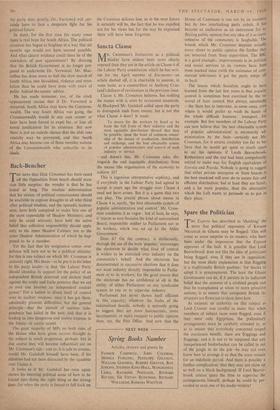Sancta Clause
MR. CROSSMAN'S limitations as a political thinker have seldom been more clearly exposed than they are in the article on Clause 4 of the Labour Party constitution which he has writ- ten for the April number of Encounter—an article dashed off, it is charitable to assume, in some haste, as a counterblast to Anthony Cros- land's defence of revisionism in the previous issue.
Clause 4, Mr. Crossman believes, has nothing the matter with it, even by revisionist standards. At Blackpool Mr. Gaitskell called upon the party to distinguish ends from means; but is not this what Clause 4 does? It reads: To secure for the workers by hand or by brain the full fruits of their industry and the most equitable distribution thereof that may be possible, upon the basis of common owner- ship of the means of production, distribution and exchange, and the best obtainable system of popular administration and control of each industry or service --and doesn't this, Mr. Crossman asks, dis- tinguish the end (equitable distribution) from the means (the organisation of the economy to achieve it)?
This is ingenious interpretative sophistry, and if everybody in the Labour Party had agreed to accept it years ago the struggle over Clause 4 need not have arisen. But it is a game that two can play. The crucial phrase about means in Clause 4 is, surely, 'the best obtainable system of popular administration and control.' Mr. Cross- man condemns it as vague: but at least, he says, it 'rejects as non-Socialist the kind of nationalised Board, responsible neither to Parliament nor to its workers, - which was set up by the Attlee Government.'
Does it? On the contrary, it deliberately, through the use of the term 'popular,' encourages the electorate to decide what kind of control it wishes to be exercised over industry on the community's behalf. And the electorate has demonstrated in successive elections that it does not want industry directly responsible to Parlia- ment or to its workers; for the good reason that the electorate has no confidence at all in the ability of either Parliament or any syndicalist system to run or to supervise industry.
Parliament has never shown itself efficient in this capacity; whatever the faults of the nationalised boards, nobody is seriously going to suggest they are more bureaucratic, more incompetent, or more resistant to public opinion than, say, the Post Office. And now that the House of Commons is run not by its members but by two interlocking party cabals, it has become so ineffective as an instrument for re- flecting public opinion that any idea of it as repre- sentative of the community is laughable. The boards which Mr. Crossman despises actually move closer to public opinion the further they are removed from State supervision. The BBC is a good example: improvements in its political and social services to its viewers have been most marked since (with the assistance of corm . mercial television) it got the party whips oft its back.
The lesson which Socialists ought to have learned from the last few years is that popular control is sometimes best exercised by the re- moval of State control. Not always, admittedly —the State has to intervene, in some cases, even where it would prefer to wash its hands of the whole difficult business: transport, , for example. But few members of the Labour Party' can now believe that 'the best obtainable system of popular administration' is necessarily ad- ministration by the State—certainly not Mr. Crossman, for it strains credulity too far to be- lieve that he would get quite so much space to air his opinions if Lords Beaverbrook, Rothermere and the rest had been compulsorily retired to make way for English equivalents of lzvestia and Pravda. Nobody is going to suggest that either private enterprise or State boards is the best mankind will ever do to secure fair and efficient distribution; but at least they are fairer, and a lot more popular, than the alternative which the Left wants to persuade us to put in their place.


































 Previous page
Previous page